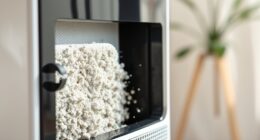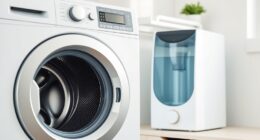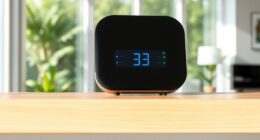Have you ever wondered which appliances consume the most electricity? We have the data you’ve been wanting.
In this article, we’ll dive into the energy-hungry world of refrigerators, air conditioners, washing machines, dryers, electric ovens, electric fans, televisions, computers, and gaming consoles.
Brace yourselves, because we’re about to reveal the power-hogging culprits lurking in your home. Get ready to master your energy consumption and make informed choices that save both the planet and your hard-earned cash.
Let’s dive in!

Key Takeaways
- Refrigerators and freezers consume a significant amount of electricity, with freezers consuming more than refrigerators on average.
- Energy-efficient washing machines use significantly less energy compared to freezers, consuming only 100-200 kWh per year.
- Regular maintenance, such as cleaning coils and organizing contents, reduces energy usage in refrigerators and freezers.
- Choosing energy-efficient appliances, such as high-efficiency washing machines and dishwashers, can help reduce electricity consumption and lower bills.
Refrigerators
Refrigerators use a significant amount of electricity in households. To reduce refrigerator electricity usage, it’s important to consider efficient refrigerator options.
Energy Star certified refrigerators are a great choice as they’re designed to be more energy efficient compared to standard models. These refrigerators use advanced technologies like improved insulation, better temperature control, and energy-saving compressors. Additionally, features like automatic defrost and adjustable temperature settings can help optimize energy usage.
When purchasing a refrigerator, it’s important to consider the size that suits your needs. A larger refrigerator will consume more electricity, so choosing a size that matches your usage is key.
Proper maintenance, such as cleaning the coils and keeping the refrigerator well-organized, can also contribute to reducing energy consumption.

Air Conditioners
When it comes to electricity consumption, air conditioners are another major contributor in households. Efficient air conditioners can help reduce energy usage and save money.
One way to improve efficiency is through regular air conditioner maintenance. By cleaning or replacing air filters, checking and cleaning coils, and ensuring proper refrigerant levels, you can ensure that your air conditioner is running efficiently.
Additionally, sealing any leaks in ducts and insulating your home can help prevent cool air from escaping, reducing the workload on your air conditioner.
Implementing these maintenance practices can lead to significant energy savings and a more comfortable living environment. So, if you want to lower your electricity consumption and increase the efficiency of your air conditioner, regular maintenance is key.

Washing Machines
Now let’s turn our attention to washing machines, another appliance that significantly contributes to electricity consumption in households. When it comes to reducing washing machine electricity usage, one of the most effective strategies is to invest in efficient washing machines. These appliances are designed to use less energy while still providing excellent cleaning performance. To help you make an informed decision, here is a table comparing the energy consumption of different types of washing machines:
| Type of Washing Machine | Energy Consumption (kWh/year) |
|---|---|
| Top-loading | 500-1000 |
| Front-loading | 200-500 |
| High-efficiency (HE) | 100-200 |
As you can see, high-efficiency front-loading washing machines consume the least amount of electricity. By opting for this type of washing machine, you can significantly reduce your energy usage and lower your electricity bills.
Dryers
When it comes to dryer energy consumption, it’s important to consider efficiency. Some dryers are designed to use less electricity while still providing effective drying.
Dryer Energy Consumption
Dryers have significant energy consumption. On average, a typical electric dryer uses around 3,000 watts of electricity per hour, while a gas dryer consumes about 750 watts. This energy consumption can lead to high electricity bills over time.

However, there are ways to reduce dryer electricity usage. One effective method is to make sure that the dryer is properly vented, as a clogged vent can decrease its efficiency. Additionally, using a lower heat setting and drying similar fabrics together can also help conserve energy.
Investing in an energy-efficient dryer is another option. These dryers are designed to use less energy while still providing effective drying results. In the following section, we’ll explore some efficient dryer options that can further help in reducing electricity usage.
Efficient Dryer Options
To explore efficient dryer options, let’s consider some models that can help us reduce electricity usage. Here are three options that stand out:
- Heat pump dryers: These innovative dryers use a heat pump to recycle and reheat the air, resulting in significant energy savings. They can achieve the same drying performance using up to 50% less electricity compared to traditional dryers.
- Gas dryers: If you have access to natural gas, opting for a gas dryer can be a cost-effective and energy-efficient choice. Gas dryers typically have lower operating costs and produce less greenhouse gas emissions.
- Efficient dryer maintenance: Regularly cleaning the lint trap and exhaust vent can improve airflow and drying efficiency. Ensuring proper ventilation and reducing load size can also help save energy.
In addition to exploring efficient dryer options, it’s important to consider other ways to reduce dryer electricity usage.
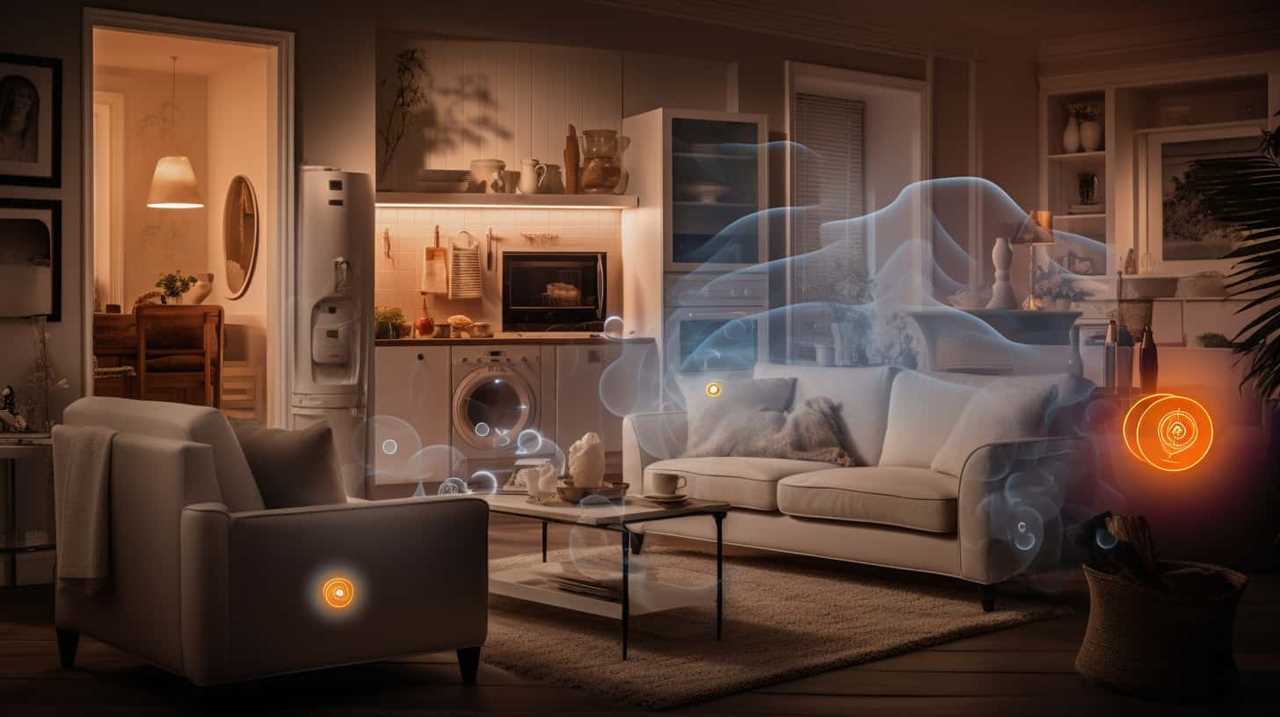
Reducing Dryer Electricity Usage
As we continue our exploration of efficient dryer options, it’s important to consider strategies for reducing electricity usage.
Implementing efficient drying techniques and investing in energy-saving laundry equipment can significantly lower the amount of electricity consumed by dryers.
One way to achieve this is by using moisture sensors, which automatically shut off the dryer when the clothes are dry, avoiding unnecessary electricity usage.
Another technique is to use a high spin speed during the wash cycle, which reduces the amount of moisture in the clothes, resulting in shorter drying times.
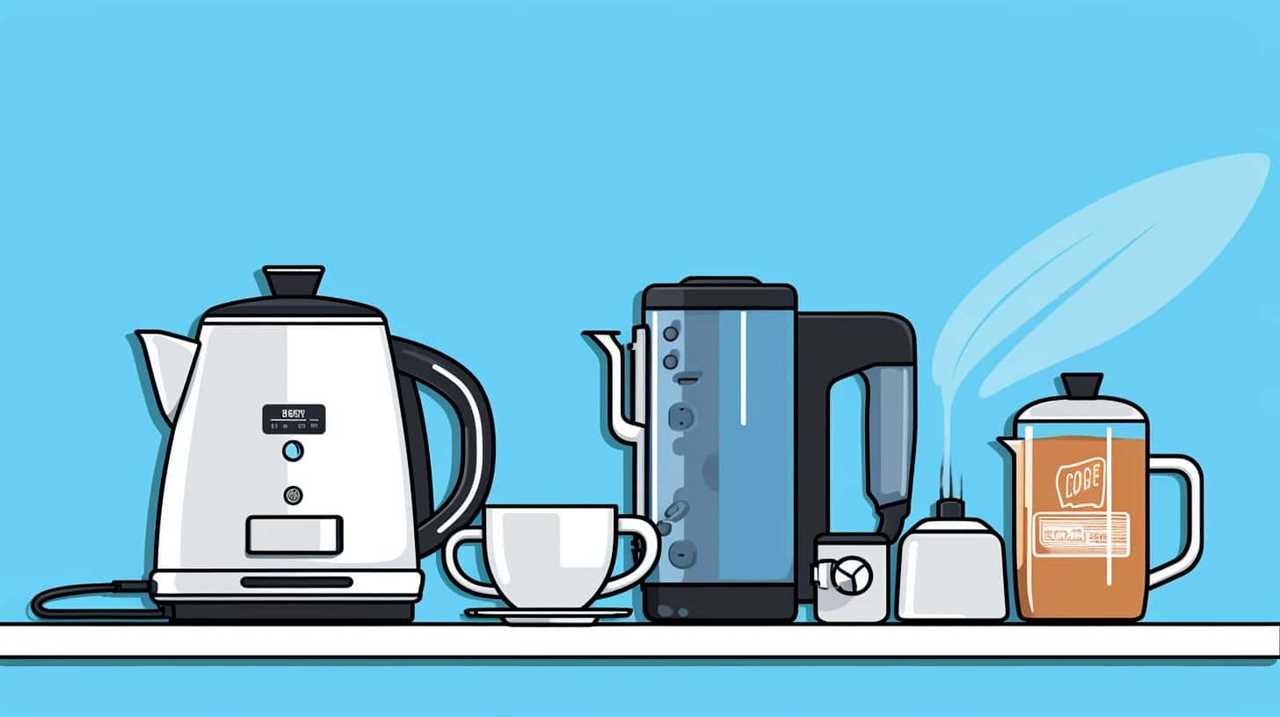
Additionally, choosing a dryer with a high energy efficiency rating, such as those labeled with the Energy Star logo, can further reduce electricity consumption.
Electric Ovens
Let’s talk about electric ovens and how they consume electricity.
When it comes to energy efficiency, there are options available that can help save on electricity usage.
On average, electric ovens consume a specific amount of power, and understanding this can be useful in managing energy consumption.
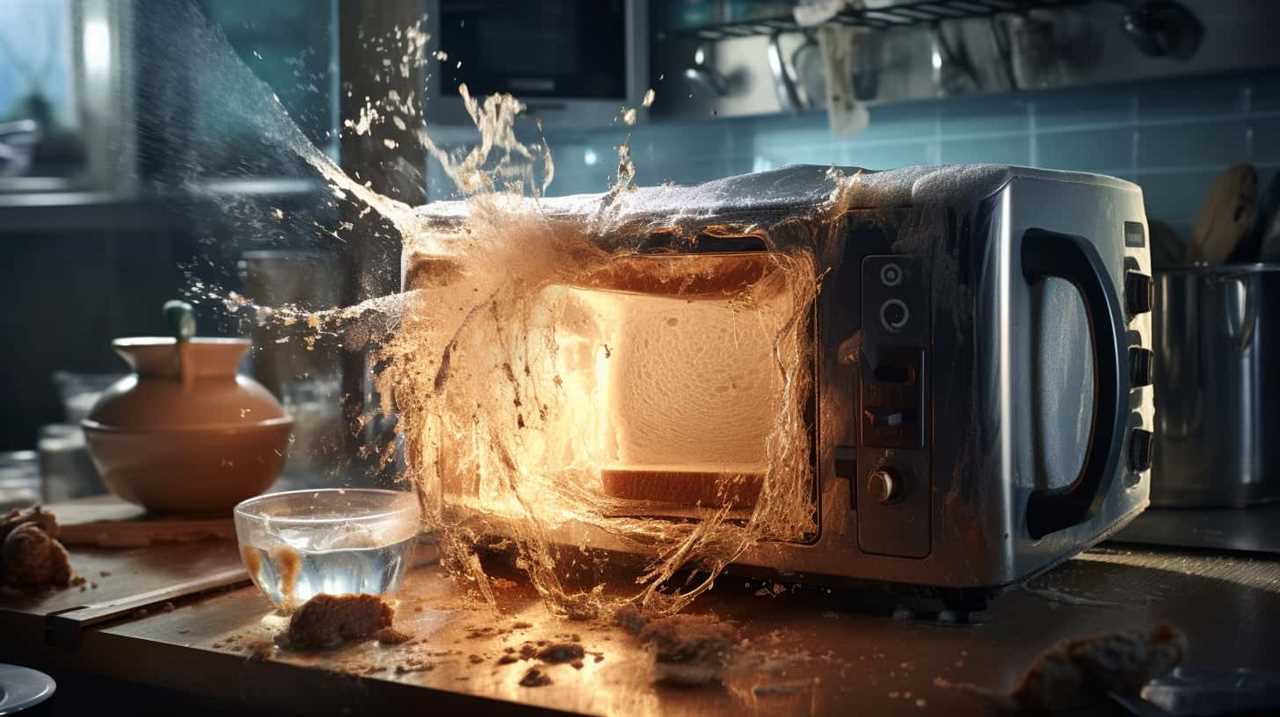
Lastly, we’ll share some cost-saving tips to help reduce electricity expenses when using electric ovens.
Energy-Efficient Oven Options
We have found several energy-efficient oven options for electric ovens. When it comes to maintaining an efficient oven, regular cleaning is essential. This not only improves the oven’s performance but also ensures that it consumes less energy. Additionally, using energy-saving cooking techniques can significantly reduce electricity consumption.
Here are three energy-efficient oven options to consider:
- Convection ovens: These ovens circulate hot air inside, reducing cooking time and energy usage.
- Induction cooktops with built-in ovens: Induction technology heats up the cookware directly, making it more energy-efficient than traditional electric ovens.
- Self-cleaning ovens with energy-saving modes: These ovens have self-cleaning features that use less energy compared to traditional cleaning methods.
By investing in these energy-efficient oven options and practicing efficient oven maintenance and energy-saving cooking techniques, you can reduce your carbon footprint and save on electricity costs.

Now, let’s delve into the average power consumption of these appliances.
Average Power Consumption
To assess the energy usage of electric ovens, it’s important to examine their average power consumption. On average, electric ovens consume around 2,000 to 5,000 watts of power per hour. However, it’s worth noting that power consumption can vary depending on the oven’s size, temperature settings, and cooking time.
To minimize energy usage and reduce electricity bills, there are several energy-saving tips to consider. Firstly, preheating the oven for only necessary dishes and avoiding excessive preheating can help conserve energy.
Additionally, using the oven’s convection feature can reduce cooking time and energy consumption. It’s also recommended to match the cookware size to the burner size, as using smaller pots and pans on larger burners can waste energy.

Cost-Saving Tips
To save on costs when using electric ovens, it’s important to be mindful of energy-saving practices. Here are three tips to help reduce your electricity bill:
- Opt for energy-efficient lighting options: Consider replacing traditional incandescent bulbs with LED or CFL bulbs. These alternatives use significantly less energy and can last up to 10 times longer.
- Use the oven efficiently: Avoid opening the oven door frequently as it causes heat loss and increases cooking time. When preheating, only turn it on when you’re ready to start cooking. Additionally, utilizing smaller appliances like toaster ovens or microwaves for smaller meals can help save energy.
- Reduce water consumption: When cleaning your oven, avoid using excessive amounts of water. Instead, opt for cleaning solutions that require less water usage.
By implementing these practices, you can save both energy and money.
Now, let’s move on to discussing cost-saving tips for electric stoves.
Electric Stoves
Electric stoves consume a significant amount of electricity when used for cooking. Compared to gas stoves, electric stoves tend to be less energy efficient. Gas stoves use natural gas as a fuel source, which is generally cheaper and more environmentally friendly than electricity.
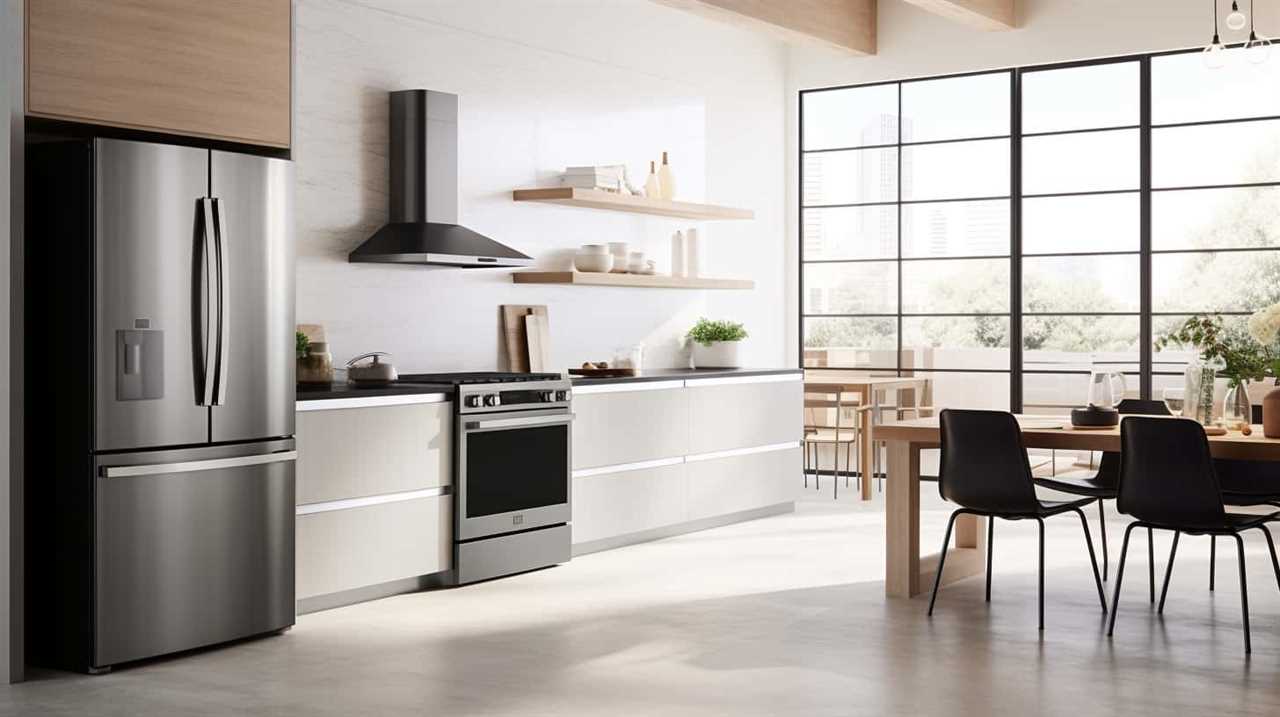
However, there are some energy-efficient options available for electric stoves. Induction cooktops, for example, use electromagnetic fields to heat the cookware directly, resulting in faster heating and less wasted energy. Another option is a convection oven, which uses a fan to circulate heat evenly, reducing cooking time and energy consumption.
When considering an electric stove, it’s important to weigh the costs and benefits of different models to make an informed decision that aligns with your energy and budget goals.
Water Heaters
Continuing our discussion on energy consumption, let’s now turn our attention to water heaters.
When it comes to reducing water heater energy usage, there are a few key factors to consider:

- Efficient water heaters: Investing in an energy-efficient water heater can significantly reduce your energy consumption. Look for models with a high Energy Factor (EF) rating, as they’re designed to use less energy while still providing hot water efficiently.
- Insulation: Properly insulating your water heater and hot water pipes can help minimize heat loss, reducing the need for your water heater to work harder and consume more energy.
- Temperature settings: Lowering the temperature setting on your water heater can lead to substantial energy savings. Most households can comfortably set their water heater to 120 degrees Fahrenheit without sacrificing comfort.
Dishwashers
When it comes to saving electricity, using dishwashers efficiently is crucial. Fortunately, there are efficient dishwasher options available that can help reduce dishwasher electricity usage.
One way to achieve this is by choosing a dishwasher with an Energy Star label, which indicates that it meets high energy efficiency standards. These dishwashers typically use less water and electricity compared to conventional models.
Additionally, using the dishwasher at full capacity and avoiding pre-rinsing dishes can further reduce electricity usage. By utilizing these efficient dishwasher options and adopting energy-saving practices, it’s possible to significantly decrease the amount of electricity consumed by dishwashers.
Now let’s move on to the next topic and discuss microwave ovens.

Microwave Ovens
As we shift our focus to microwave ovens, it’s important to consider their energy consumption and efficiency. When it comes to microwave oven safety, here are a few key tips to keep in mind:
- Always use microwave-safe containers and avoid using metal or aluminum foil.
- Make sure to leave enough space for proper ventilation around the microwave to prevent overheating.
- Avoid heating liquids for too long, as they can become superheated and potentially explode when disturbed.
In terms of microwave oven cooking tips, here are a few suggestions:
- Use microwave-safe covers or microwave-safe plastic wrap to prevent splatters and retain moisture.
- Stir or rotate food midway through the cooking process for more even heating.
- Cut food into smaller pieces for faster and more efficient cooking.
Freezers
When it comes to freezers, there are a few key points to consider.
First, it’s important to look for energy-efficient options that can help reduce electricity consumption.

Second, comparing power consumption ratings can give us an idea of which freezers use less energy.
Energy-Efficient Freezer Options
To maximize energy efficiency, we recommend exploring energy-efficient freezer options. When it comes to energy efficient freezer models, there are several options to consider:
- ENERGY STAR certified freezers: These models meet strict energy efficiency guidelines set by the U.S. Environmental Protection Agency and can save you up to 10% in energy costs compared to non-certified models.
- Chest freezers: Chest freezers are known for their superior insulation and energy efficiency. Their design allows cold air to stay inside even when the lid is opened, reducing energy wastage.
- Manual defrost freezers: Manual defrost freezers consume less energy compared to self-defrosting models. By manually defrosting the freezer regularly, you can maintain its efficiency and reduce energy consumption.
By choosing energy-efficient freezer models and considering these options, you can significantly reduce your freezer energy consumption.
Now, let’s move on to power consumption comparisons to further understand energy usage among different appliances.

Power Consumption Comparisons
In terms of power consumption, let’s look at how freezers compare to other appliances.
When it comes to refrigerator energy efficiency, freezers tend to consume more electricity than their counterparts. On average, a freezer consumes about 400-600 kWh per year. In comparison, a standard refrigerator uses around 300-400 kWh per year.
However, it’s important to note that energy-saving washing machines use significantly less energy, with some models consuming only 100-200 kWh per year. If you’re concerned about reducing your energy consumption, opting for an energy-saving washing machine might be a more efficient choice.
Nevertheless, when comparing freezers to other appliances, it’s clear that they tend to consume more electricity.

Reducing Freezer Electricity Usage
As we continue our exploration of power consumption, let’s now dive into reducing freezer electricity usage. To minimize the energy consumed by your freezer, consider the following tips:
- Reduce the freezer temperature: Lowering the freezer temperature by just a few degrees can significantly decrease energy consumption. Aim to keep your freezer at around 0°F (-18°C) to strike the right balance between preserving food quality and minimizing energy usage.
- Organize your freezer: A well-organized freezer not only makes it easier to find items but also improves energy efficiency. Arrange food items in a way that allows for proper airflow and prevents overpacking. This ensures that the freezer can maintain a consistent temperature and reduces the need for the compressor to work harder.
- Keep the freezer full: A full freezer is more energy-efficient since the frozen items help to retain the cold. If your freezer isn’t fully stocked, consider using containers filled with water to occupy the empty space.
Electric Heaters
We use electric heaters during the winter to keep us warm and cozy. However, it’s important to be aware of their energy consumption and explore options to save electricity. To help you understand the energy usage of electric heaters, here is a comparison table:
| Heater Type | Power Consumption (Watts) |
|---|---|
| Ceramic Space Heater | 750-1500 |
| Oil-Filled Radiator | 600-1500 |
| Infrared Heater | 750-1500 |
| Electric Fireplace | 750-1500 |
As you can see, the power consumption of electric heaters can vary depending on the type. By selecting energy-efficient models and using them wisely, you can reduce your electricity usage. Additionally, maintaining your dryer properly and exploring energy-saving heating options can further contribute to lowering your overall energy consumption. Now, let’s move on to discussing electric fans.
Electric Fans
When it comes to electric fans, it’s important to consider their power consumption. Fans can vary in their energy usage depending on factors such as size, speed settings, and efficiency ratings.

Energy-saving fan options are available that can help reduce electricity consumption while still providing adequate cooling.
Understanding the impact of electric fans on electricity bills is crucial in making informed choices for both comfort and energy efficiency.
Fan Power Consumption
How much electricity do electric fans consume? When it comes to fan power consumption, it’s important to choose efficient fan models and implement energy-saving tips to minimize electricity usage.
Here are some key points to consider:

- Opt for Energy Star certified fans: These models are designed to consume less energy while providing efficient cooling.
- Adjust fan speed: Running the fan at a lower speed can significantly reduce energy consumption.
- Utilize timers or programmable thermostats: These tools allow you to schedule fan usage, ensuring it operates only when needed.
Implementing these fan energy-saving tips can help you reduce electricity consumption while still enjoying the comfort of a cool breeze. By making informed choices and utilizing energy-efficient features, you can minimize the impact of electric fans on your energy bill.
Energy-Saving Fan Options
One option for reducing electricity consumption with electric fans is to choose energy-saving models. These fans are designed with features that maximize airflow while minimizing energy usage. By investing in an energy-saving fan, you can enjoy a cool and comfortable environment without worrying about high electricity bills. To help you make an informed decision, here are three of the best fan brands for energy efficiency:
| Brand | Energy-Saving Features | Energy Efficiency Rating |
|---|---|---|
| Dyson | Bladeless design, variable speed settings | A++ |
| Honeywell | Programmable timer, sleep mode | A+ |
| Lasko | Oscillating feature, energy-efficient motor | A |
These brands have consistently prioritized energy efficiency in their fan designs, making them ideal choices for those seeking to save electricity. Consider these options when looking for an energy-saving fan that fits your needs.
Impact on Electricity Bills
Electric fans can have a significant impact on our electricity bills. Here’s how they can affect your average monthly electricity bill:
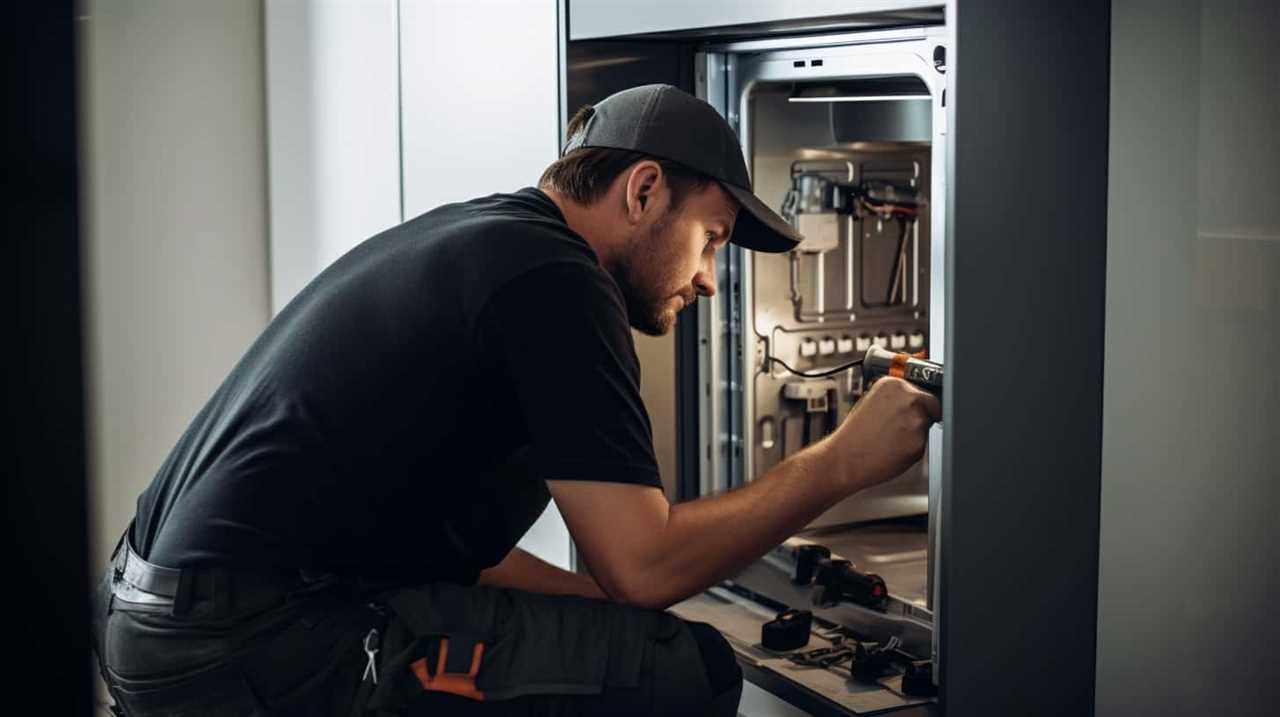
- Traditional fans: These fans are energy-intensive and can consume a substantial amount of electricity. They can contribute to higher electricity bills, especially if used for long periods.
- Energy-saving fans: These fans are designed to consume less energy while still providing effective cooling. They’re equipped with efficient motors and advanced technologies, such as blade designs and timers, to reduce power consumption.
- Smart fans: These fans take energy efficiency to the next level. They incorporate features like sensors and Wi-Fi connectivity, allowing you to optimize their usage and energy consumption based on your preferences and schedule.
Investing in energy-saving or smart fans can help reduce your electricity bills, as they consume less power compared to traditional fans.
Televisions
When it comes to electricity consumption, televisions are one of the most energy-intensive appliances. The amount of electricity a television uses depends on several factors, such as screen size, display technology, and usage patterns. To give you an idea of television energy usage, here is a comparison table showcasing the power consumption of different television types:
| Television Type | Average Power Consumption (Watts) |
|---|---|
| LCD | 50-150 |
| LED | 30-100 |
| OLED | 50-200 |
| Plasma | 100-400 |
As you can see, plasma televisions tend to consume the most power, while LED and LCD televisions are generally more energy-efficient. It’s important to consider these figures when purchasing a television and to be mindful of your usage habits to minimize power consumption and save on electricity bills.
Computers
Moving on to computers, they’re another appliance that can consume a significant amount of electricity. When considering energy efficient computer options, here are a few key factors to consider:
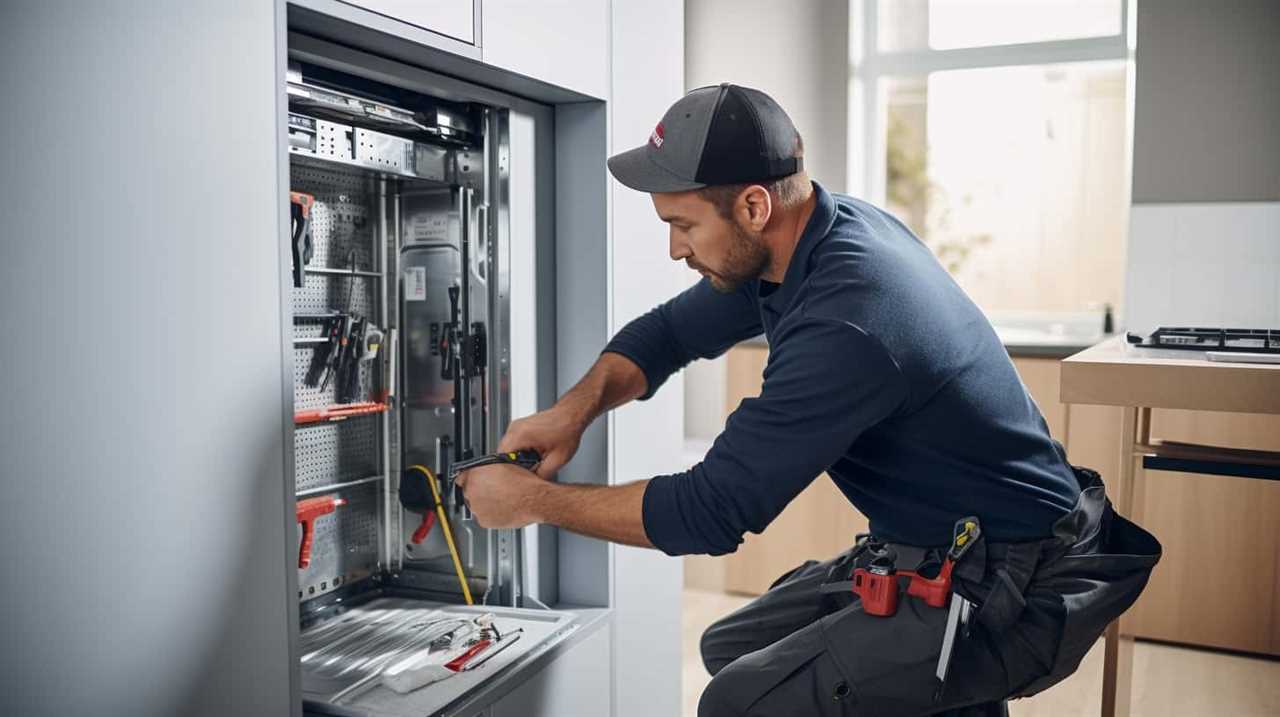
- Power-saving features: Look for computers with power-saving modes that automatically reduce energy consumption when the computer is idle.
- Energy Star certification: Energy Star certified computers meet strict energy efficiency requirements and can help save electricity.
- Laptop vs. desktop: Laptops generally consume less energy than desktop computers, so opting for a laptop can be a more energy-efficient choice.
Gaming Consoles
Now let’s delve into the world of gaming consoles, where our choices can have a significant impact on our electricity consumption.
When it comes to gaming console power usage, it’s essential to consider energy efficiency. Some gaming consoles consume more electricity than others, so choosing an energy-efficient option can help reduce our overall energy consumption and lower our electricity bills.
Energy-efficient gaming consoles are designed to minimize power consumption while still delivering an enjoyable gaming experience. These consoles often come with features such as power-saving modes and automatic shut-off timers, which help conserve energy when not in use.
Frequently Asked Questions
How Can I Reduce the Electricity Consumption of My Refrigerator?
To reduce refrigerator energy consumption, we can follow these energy-saving tips: adjust temperature settings, keep the coils clean, minimize door openings, and ensure proper ventilation. These practices will help save electricity and lower energy bills.
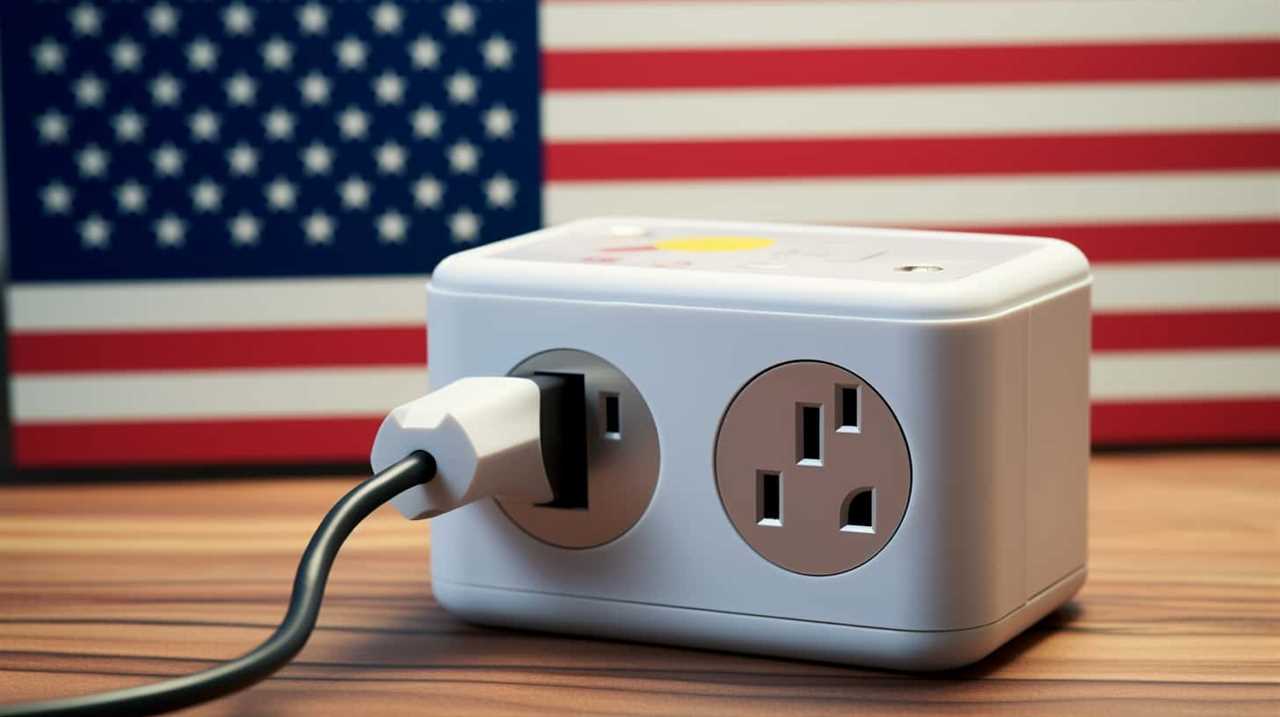
Is It More Energy-Efficient to Use a Dishwasher or Wash Dishes by Hand?
Using a dishwasher is generally more energy-efficient than washing dishes by hand. It uses less water and requires less effort. Additionally, using a clothesline instead of a dryer can save energy and reduce utility bills.
What Are Some Energy-Saving Tips for Using a Washing Machine?
Energy-efficient washing machine models can save significant amounts of electricity. Additionally, using cold water for washing can further reduce energy consumption. These two strategies combined can help us achieve a more sustainable and cost-effective laundry routine.
How Can I Lower the Electricity Usage of My Air Conditioner?
To decrease air conditioner energy usage, we can use a fan instead. This reduces electricity consumption and provides cost savings. Additionally, fans circulate air, creating a cool breeze and improving air circulation in the room.
Are There Any Energy-Efficient Alternatives to Using an Electric Oven for Cooking?
There are energy-efficient cooking methods available, such as using a microwave. It offers benefits like faster cooking times and lower energy consumption. These alternatives can help reduce electricity usage in the kitchen.

Conclusion
In conclusion, after analyzing the data, it’s evident that refrigerators, air conditioners, and electric ovens consume the most electricity among household appliances. These energy-hungry appliances can have a significant impact on our electricity bills.
Therefore, it’s crucial to be mindful of their usage and consider energy-efficient alternatives. Remember, knowledge is power, and understanding which appliances consume more electricity can help us make informed decisions and reduce our energy consumption.






